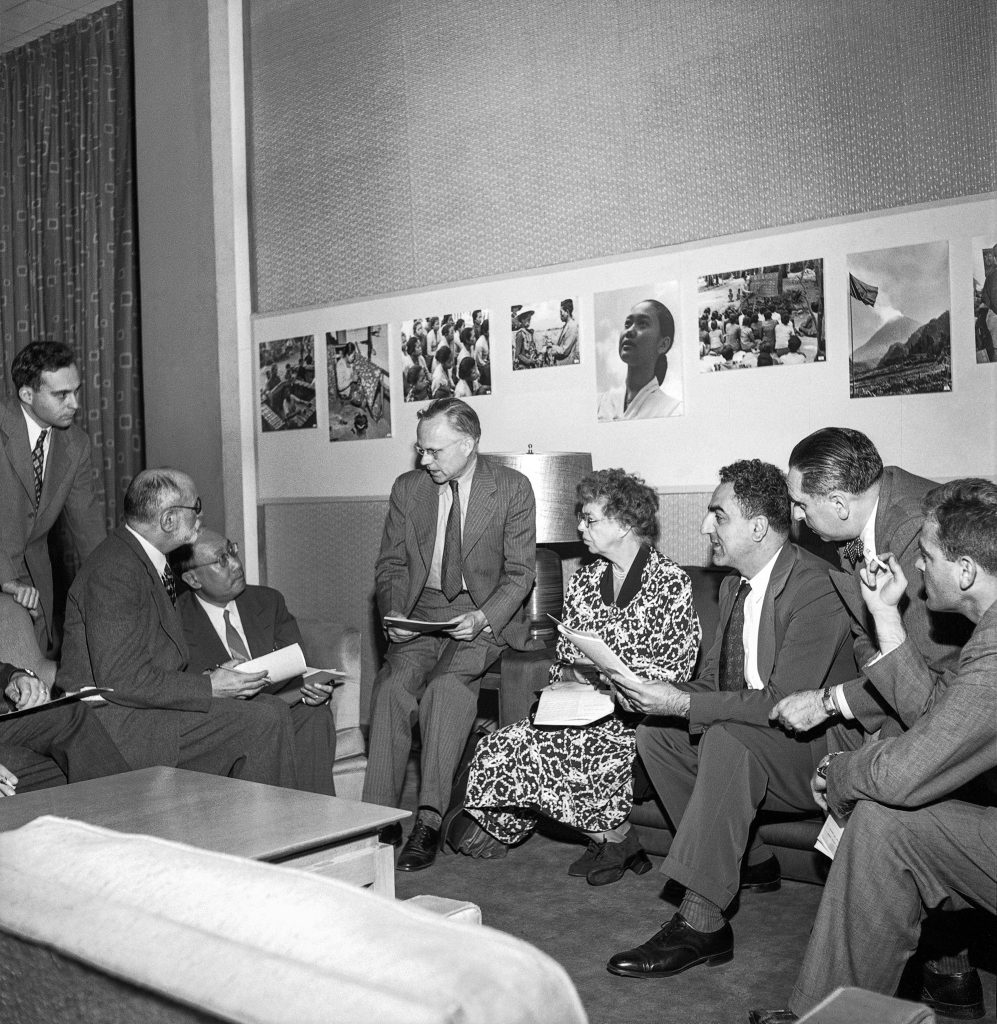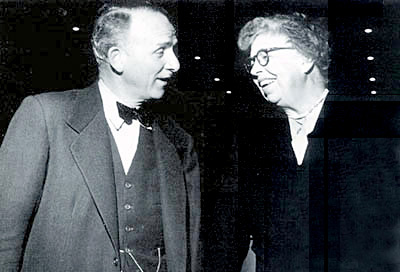
Paul Martens is an associate professor of ethics at Baylor University. This post is excerpted from an article in the December 2023 special issue of The Review of Faith & International Affairs commemorating the 75th anniversary of the UDHR.
In early 1947, the United Nations Commission on Human Rights embraced a clear mandate to draft an international “bill of rights” that would eventually become the Universal Declaration of Human Rights (UDHR). Seventy-five years later, this document has become rather familiar and ordinary; at the time, it was daringly revolutionary, and its adoption was vehemently contested. Few saw the revolutionary nature of the UDHR as clearly as John Peters Humphrey, the first director of the Division of Human Rights at the United Nations; even fewer had the opportunity to shape its terms and categories. The purpose of the following commentary is, therefore, to recount the unlikely contribution of Humphrey to the UDHR and, especially, its foundational affirmation of human dignity.
The first move in making the UDHR a reality fell to Eleanor Roosevelt (chairperson of the Commission on Human Rights), P. C. Chang (vice-chairperson), and Charles Malik (rapporteur), with the help of the Secretariat. This small group was charged with preparing a first draft of a bill of rights. At the time, John Humphrey was director of the UN’s Secretariat Division for Human Rights and, as such, was invited—along with Malik and Chang—by Roosevelt for tea at her Washington Square apartment to discuss the path forward. This tea proved to be exceptionally consequential: before tea was over, it was decided that Humphrey would prepare the preliminary draft.

The fateful decision to choose Humphrey is surprising for several reasons. First, Humphrey was not a representative on the Commission on Human Rights but, for all intents and purposes, was a paid employee of the UN with virtually none of the public recognition accorded all others present. Second, there is little in Humphrey’s background that would justify his selection. His childhood was almost comically tragic: his parents both passed when he was young, he lost his left arm when he was six in what was clearly some foolishness with friends gone awry, and he was sent to various boarding schools where he was ridiculed and his academic performance was uninspiring, at best. His secondary education was cobbled together between McGill University and Toronto. And even though his graduation from McGill’s law school with first-class honors in 1929 landed him a job as a professor there, his unexpected ascension to international diplomacy occurred almost a decade later through Henri Laugier, former president of the French National Center for Scientific Research.
Laugier, exiled from France during the Nazi occupation, ended up with a temporary appointment at the University of Montreal. Eventually finding himself in Humphrey’s circle of friends in the early 1940s, Laugier saw something in Humphrey that he would remember when he became assistant secretary general of the UN Department of Social Affairs after the war. And as soon as the position of director of the Human Rights Division opened up, Laugier offered it to Humphrey. It was in this unlikely capacity that Humphrey would quickly find himself in Roosevelt’s apartment with the responsibility of drafting the UDHR.
By his own admission, Humphrey was no Thomas Jefferson. Further, he was not especially charismatic, it would be a stretch to say he was a creative or original thinker, and it is very clear that he was not a systematic thinker. But, like Laugier, Roosevelt must have seen something in Humphrey to warrant granting him the responsibility of preparing the first draft. While Laugier and Roosevelt never say as much, I suspect that “something” they saw could be fairly described as a clear commitment to human rights growing out of a foundational affirmation of human dignity in a broad and revolutionary sense. To my mind, that is the only way to make sense of the shape, content, and lasting legacy of Humphrey’s initial draft.

Certainly, when Humphrey returned with a completed draft, the response was lukewarm at best. Drawing on a wide range of declarations from sources as various as liberation theology and the American Law Institute, he produced a list of 4 prefatory principles, 48 short articles, and 408 pages of supplementary material as an addendum. When questioned about the philosophy behind the document, he claimed there was none. Rather, he simply sought to provide a series of clear and justiciable rights that could be legally adjudicated in a supranational context beyond the domestic jurisdiction of states.
Throughout Humphrey’s draft, human dignity is the implied rationale for particular rights, and the concept is explicitly named at least three times. The most explicit is in the draft’s Article 8, which states that slavery is inconsistent with the dignity of humans and, therefore, prohibited by the bill of rights. In this article we see clearly that human dignity preexists and grounds human rights in an obvious manner, negatively defining the limitations of social interaction. Beyond this negative statement of rights, positive statements are also plentiful in Humphrey’s draft: the right to good food and housing, the right to rest and leisure, and the right to participate in the cultural life of a community are but a few examples. For Humphrey, there is no right to dignity; dignity is present and demands rights. Humphrey’s draft was eventually rearranged, rewritten, and many contested revisions followed. Yet on this conviction that human dignity grounds and justifies human rights, there is continuity from Humphrey’s draft to the first words of the Preamble of the UDHR: “Whereas recognition of the inherent dignity and of the equal and inalienable rights of all members of the human family is the foundation of freedom, justice and peace in the world.”
Biographically, Humphrey’s convictions concerning human dignity are contextualized and grow out of his formative Christian convictions. By the 1940s, he had given up on his daily devotion to the Bible and the Book of Common Prayer, yet he could not shake his attraction to what he would refer to as “Christian morality without the tommyrot.” Whatever one makes of Humphrey’s idiosyncratic religious journey, it appears that the affirmation of human dignity is not limited to Christian morality, as the UDHR was affirmed by representatives belonging to an array of the world’s religions (and that affirmation continues across faith traditions to this day).
This year, seventy-five years later, as we are repeatedly confronted by threats to human rights in our neighborhoods and around the world, we again need to hear and respond to the moral demands, straightforwardly and pragmatically affirmed by Humphrey, that stand above any domestic jurisdiction—that is, the demands of human dignity.
